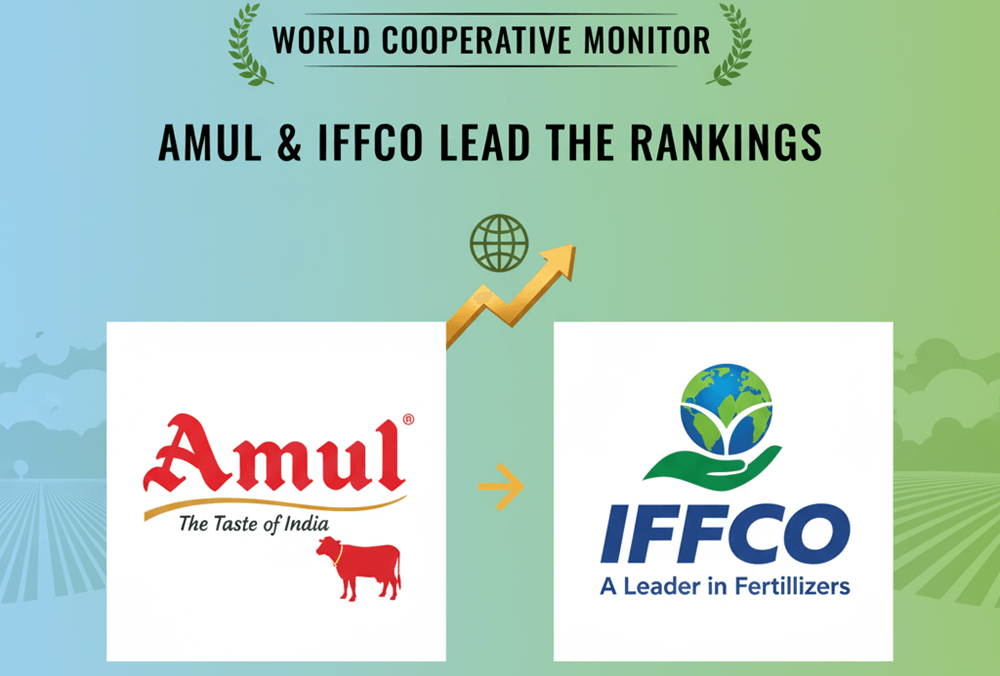Context:
Two Indian farmer-owned cooperatives — Amul (Gujarat Cooperative Milk Marketing Federation Ltd – GCMMF) and Indian Farmers Fertiliser Cooperative Limited (IFFCO) — have achieved global recognition by securing the top two positions in the ICA World Cooperative Monitor 2025, released in Doha, Qatar.
The ranking was published by the International Cooperative Alliance (ICA) in collaboration with EURICSE (European Research Institute on Cooperative and Social Enterprises).
Key Highlights:
Global Ranking:
Amul (GCMMF) — Rank 1 globally.
IFFCO — Rank 2 globally.
Both cooperatives represent India’s strong cooperative movement, particularly in the agriculture and rural sectors.
Ranking Criteria:
Based on GDP per capita performance and overall economic impact.
Evaluated the turnover, employment generation, and social contribution of cooperative enterprises.
About the ICA World Cooperative Monitor:
An annual report by the International Cooperative Alliance (ICA) and EURICSE.
It analyses and ranks the largest cooperatives and mutuals worldwide based on economic size and social relevance.
Highlights the role of cooperatives in achieving inclusive growth and sustainable development.
About the International Cooperative Alliance (ICA):
Headquarters: Brussels, Belgium.
A global body representing over 3 million cooperatives and 1 billion cooperative members worldwide.
Works to promote the values of self-help, democracy, equality, and solidarity.
About EURICSE:
Full form: European Research Institute on Cooperative and Social Enterprises.
Based in Italy, it supports research and policy analysis related to cooperatives and social enterprises.
About the Indian Cooperatives Recognised
1. Amul (Gujarat Cooperative Milk Marketing Federation Ltd – GCMMF):
Established: 1946 in Anand, Gujarat.
Founder: Tribhuvandas Patel under the guidance of Sardar Vallabhbhai Patel and Dr. Verghese Kurien.
Structure: A federation of 18 district milk unions covering over 3.6 million milk producers.
Significance:
Backbone of India’s White Revolution.
Contributes to rural livelihoods, women’s empowerment, and nutritional security.
Symbol of India’s successful cooperative model in dairy production.
2. IFFCO (Indian Farmers Fertiliser Cooperative Limited):
Established: 1967.
Members: Over 36,000 cooperative societies representing millions of farmers.
Operations: Produces and distributes fertilisers, soil nutrients, and agricultural inputs.
Significance:
One of the world’s largest fertiliser cooperatives.
Focuses on sustainable agriculture, green initiatives, and rural development.
Promotes use of bio-fertilisers, nanotechnology-based fertilisers, and digital agriculture platforms.
Global Significance:
Recognition of India’s cooperative strength on a global platform.
Demonstrates how member-owned enterprises can drive inclusive growth and socio-economic empowerment.
Supports India’s image as a leader in cooperative innovation and rural transformation.
Connection to UN International Year of Cooperatives (IYC) 2025:
The recognition coincides with the conclusion of the UN International Year of Cooperatives 2025, hosted in Doha.
The IYC theme emphasizes “Empowering Communities through Cooperatives”.
Highlights cooperatives as key vehicles for achieving the UN Sustainable Development Goals (SDGs).
UPSC Relevance:
GS Paper 2 – Governance & Social Justice
Role of cooperatives in inclusive development.
Importance of democratic and member-based organisations.
Contribution of Amul and IFFCO to rural empowerment and food security.
GS Paper 3 – Economy
Agricultural growth through cooperative models.
Value addition in the dairy and fertiliser sectors.
Contribution to sustainable economic development.
Conclusion:
The global recognition of Amul and IFFCO as the top two cooperatives underscores the success of India’s cooperative model, which blends economic efficiency with social equity.
It validates India’s long-standing commitment to grassroots development, self-reliance, and collective prosperity — principles deeply rooted in the cooperative movement.







